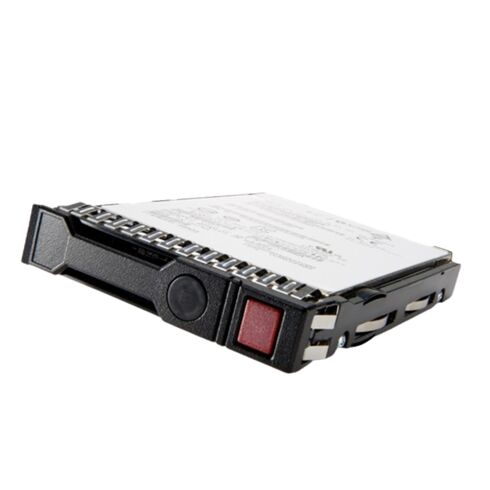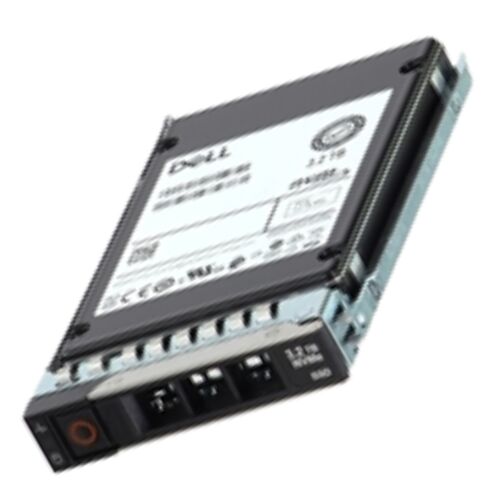345-BGMR Dell 3.2TB SED SAS-24Gbps Mixed Use 3DWPD 2.5Inch SSD
- — Free Ground Shipping
- — Min. 6-month Replacement Warranty
- — Genuine/Authentic Products
- — Easy Return and Exchange
- — Different Payment Methods
- — Best Price
- — We Guarantee Price Matching
- — Tax-Exempt Facilities
- — 24/7 Live Chat, Phone Support
- — Visa, MasterCard, Discover, and Amex
- — JCB, Diners Club, UnionPay
- — PayPal, ACH/Bank Transfer (11% Off)
- — Apple Pay, Amazon Pay, Google Pay
- — Buy Now, Pay Later - Affirm, Afterpay
- — GOV/EDU/Institutions PO's Accepted
- — Invoices
- — Deliver Anywhere
- — Express Delivery in the USA and Worldwide
- — Ship to -APO -FPO
- — For USA - Free Ground Shipping
- — Worldwide - from $30
Dell 3.2TB SED SAS Enterprise SSD Overview
Technical Specifications
- Manufacturer: Dell
- Part Number: 345-BGMR
- Capacity: 3.2TB
- Form Factor: 2.5-inch, 15mm thick
- Interface: SAS-4 (24Gbps)
- Encryption: Self-encrypting technology (SED)
- Drive Writes Per Day (DWPD): 3
Key Features
- Self-Encrypting Drive (SED) for enhanced data security
- 3.2TB storage capacity designed for enterprise-grade applications
- SAS-4 interface with 24Gbps bandwidth for rapid data transfers
- Small Form Factor (SFF) – 2.5-inch size for compact deployment
- Optimized for mixed-use environments with 3 Drive Writes Per Day (DWPD)
- 3D TLC NAND Flash for reliable performance and endurance
Performance and Speed
- Sequential Read Speed (128KiB): 4200MB/s
- Sequential Write Speed (128KiB): 3650MB/s
- Random Read IOPS (4KiB): 720K
- Random Write IOPS (4KiB): 340K
- Data Protection: Integrated loss prevention mechanisms
- MTBF (Mean Time Between Failures): 2,500,000 hours
Connectivity and Expansion
- Interface: 1 x SAS 24Gb/s
- Hot-Swap Compatible: Yes, fits 2.5-inch bays
Compatibility with PowerEdge Servers
- Compatible Systems: PowerEdge C6420, C6520, C6525, C6615, C6620, HS5610, HS5620, R260, R350, R360, R440, R450, R550, R640, R650, R650xs, R6515, R6525, R660, R660xs, R6615, R6625, R740, R740xd, R750, R750xa, R750xs, R7515, R7525, R760, R760xa, R760xs, R7615, R7625, R840, R860, R940, R940xa, R960, T550, T560, XR7620
Endurance and Reliability
- Mixed Use Endurance Type
- 3 Drive Writes Per Day (DWPD), ensuring long-term durability
- Designed for enterprise-class environments requiring frequent read/write operations
345-BGMR Dell 3.2TB SAS-24Gbps Mixed Use SSD
The 345-BGMR Dell 3.2TB SED SAS-24Gbps Mixed Use SSD is a high-performance solid-state drive (SSD) designed to meet the demanding storage needs of enterprise applications. This drive offers exceptional speed, reliability, and security, making it an ideal solution for data centers, cloud environments, and other mission-critical workloads. Its ability to handle mixed-use environments, where both read-intensive and write-intensive tasks occur, sets it apart as a versatile storage solution.
Key Features of the Dell 345-BGMR SSD
- Capacity: 3.2TB storage capacity, allowing ample space for large data volumes and fast access to mission-critical information.
- SED (Self-Encrypting Drive): Provides enhanced data security with hardware-based encryption, protecting sensitive data from unauthorized access.
- SAS Interface: The 24Gbps SAS (Serial Attached SCSI) interface offers fast data transfer rates, ensuring rapid access to data and reduced latency.
- Mixed Use Workload Support: Ideal for environments with both read and write tasks, delivering up to 3 Drive Writes Per Day (DWPD).
- 2.5-Inch Form Factor: Compact design for easy integration into server and storage environments with space constraints.
- 3DWPD Endurance: The drive is built to withstand 3 drive writes per day, ensuring durability and longevity under intensive workloads.
Understanding SAS 24Gbps Technology
The Dell 345-BGMR SSD features SAS 24Gbps technology, a high-speed interface that enables faster data access and transfer. Serial Attached SCSI (SAS) is a point-to-point architecture used primarily in enterprise storage solutions due to its superior performance and reliability compared to SATA-based drives. SAS drives, particularly those supporting 24Gbps bandwidth, are designed for environments where quick access to vast amounts of data is crucial, such as in large databases, big data applications, and real-time analytics.
Benefits of SAS over SATA
- Higher Speed: SAS interfaces can provide significantly higher data transfer rates compared to SATA, with the 24Gbps version reaching speeds twice as fast as earlier generations.
- Better Reliability: SAS drives are known for their higher Mean Time Between Failures (MTBF), offering better durability in enterprise environments.
- Dual Porting: SAS drives support dual-porting, providing redundancy in case of controller or path failure, which is a critical feature for high-availability systems.
Why 24Gbps SAS is Ideal for Mixed Use Workloads
The 24Gbps SAS interface is particularly well-suited for mixed-use workloads because of its ability to handle high-speed data transfers in both read and write operations. Whether it's processing transactional databases or running virtual machines, the increased bandwidth ensures that latency is minimized and throughput is maximized. The Dell 345-BGMR SSD leverages this speed to deliver a robust and efficient performance, even under demanding mixed-use scenarios.
Mixed Use SSDs: What Sets Them Apart?
Mixed use SSDs, such as the Dell 345-BGMR 3.2TB SED SAS-24Gbps drive, are designed to efficiently handle a balanced mix of read and write operations. Unlike read-intensive SSDs, which are optimized for environments where the majority of tasks involve reading data, mixed-use SSDs are built to excel in scenarios that involve both frequent reads and writes. This makes them ideal for applications such as online transaction processing (OLTP), databases, and virtualization, where both types of operations are prevalent.
Performance and Endurance for Enterprise Applications
The Dell 345-BGMR 3.2TB SSD is capable of handling up to 3 Drive Writes Per Day (DWPD), meaning that the drive can write and erase up to three times its total capacity in data every day without impacting its longevity. This high endurance level ensures that the drive can withstand the rigors of enterprise workloads, providing both the speed and durability required for high-performance computing tasks.
Applications Suited for Mixed Use SSDs
- Virtualized Environments: Mixed-use SSDs are excellent for virtualized workloads that involve constant read and write operations, such as the spinning up and down of virtual machines.
- Databases: High-performance databases, such as those used in OLTP applications, benefit from the balanced performance of mixed-use SSDs.
- Cloud Storage: As cloud environments often require frequent data access and storage operations, mixed-use SSDs offer the resilience and speed necessary for optimal performance.
- Big Data Analytics: Processing large data sets for real-time analytics involves both intensive reading and writing of data, a task that mixed-use SSDs can handle efficiently.
Why Endurance Matters
In enterprise environments, where data is constantly being written and erased, the endurance of an SSD is critical. With 3 DWPD, the Dell 345-BGMR offers excellent endurance, ensuring that it can handle the large volume of write operations typical in mixed-use applications. This level of endurance is vital for maintaining the reliability and performance of storage infrastructure over the long term.
Security with Self-Encrypting Drives (SED)
Data security is a top priority for businesses, and the Dell 345-BGMR SSD includes Self-Encrypting Drive (SED) technology to safeguard sensitive information. An SED automatically encrypts data as it is written to the drive, and decrypts it when read, ensuring that data is protected at all times.
Advantages of Hardware-Based Encryption
SEDs offer hardware-based encryption, which provides several advantages over software-based encryption methods:
- Faster Performance: Hardware encryption does not slow down the performance of the drive, unlike some software encryption methods that can reduce data access speeds.
- Stronger Security: The encryption keys are stored on the drive itself and are not exposed to the host system, making them less vulnerable to external attacks.
- Compliance: SEDs help organizations meet regulatory requirements for data protection, such as GDPR, HIPAA, and PCI-DSS, by ensuring that sensitive data is securely encrypted.
Data Protection in Enterprise Environments
The Dell 345-BGMR’s SED functionality is especially important in enterprise environments where data breaches can lead to significant financial and reputational damage. By encrypting data at rest, businesses can ensure that even if drives are lost or stolen, the information stored on them remains protected.
Instant Secure Erase
One of the key features of an SED is the ability to perform an Instant Secure Erase (ISE). This function instantly renders the data on the drive unreadable by erasing the encryption key, making the drive safe for reuse or disposal. This feature is particularly useful for organizations that need to decommission drives while ensuring that sensitive data is fully protected.
2.5-Inch Form Factor: Compact and Efficient
The 2.5-inch form factor of the Dell 345-BGMR SSD offers a compact solution that is ideal for dense storage environments. This small form factor allows for more drives to be installed in a given amount of space, maximizing the storage capacity of server racks and other enterprise storage systems.
Optimized for Enterprise Storage Solutions
As enterprise environments continue to grow in complexity and scale, the need for efficient storage solutions becomes paramount. The 2.5-inch form factor is designed for use in high-density storage arrays, enabling businesses to deploy large amounts of storage capacity without requiring significant physical space.
Space-Saving Benefits
- Maximized Rack Space: The small size of 2.5-inch drives allows for more drives to be installed in each rack, increasing the total storage capacity available in data centers.
- Energy Efficiency: 2.5-inch drives typically consume less power than their larger counterparts, helping to reduce the overall energy consumption of storage systems.
- Improved Cooling: With their smaller size, 2.5-inch













